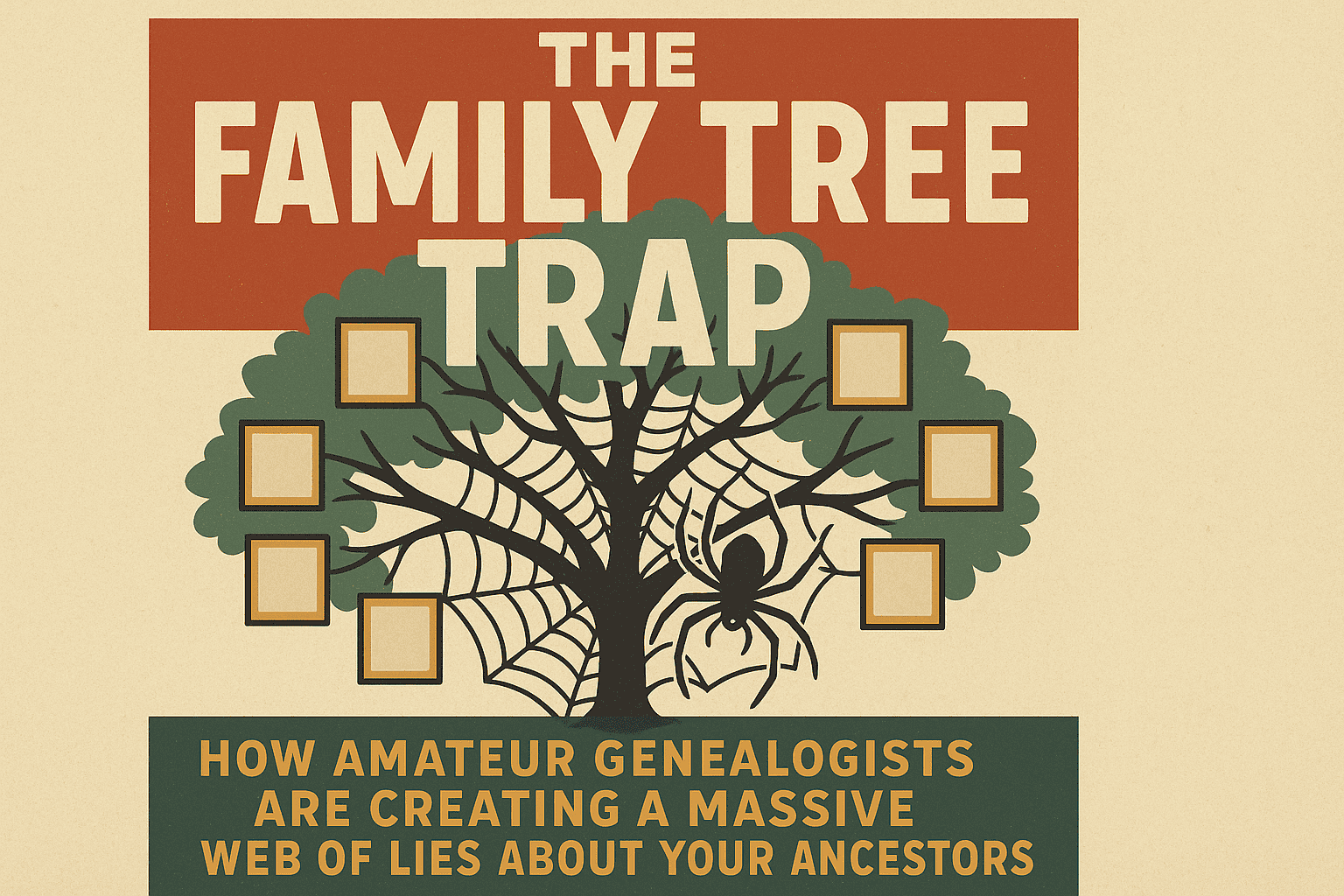Your great-great-grandfather wasn’t a Civil War hero.
He wasn’t born in 1695 and living in Cincinnati in 1911 either.
And you’re definitely not descended from Charlemagne.
Here’s the truth: Right now, millions of Americans are spreading fake information about their ancestors.
And if you’ve spent more than 10 minutes on Ancestry.com, you’re probably doing it too.
The Copy-Paste Catastrophe
Let me paint you a picture.
Sarah from Ohio finds a family tree that mentions her great-grandmother.
She’s excited. She clicks “add to tree.” Done.
But that tree was wrong.
Now Sarah’s tree is wrong. And when Tom from Texas finds Sarah’s tree next week?
He copies it. Then Linda copies Tom’s. Then Marcus copies Linda’s.
Six months later, 247 people have the wrong great-grandmother.
This isn’t rare. This is Tuesday.
Here’s what I found in a single Reddit thread:
- A person born in 1695 showing up on the 1910 census
- Children being born when their mothers were 7 years old
- A guy married to 5 different women with 47 children
- Someone born in Virginia who “popped over to England” for baptism
One user said it best: “Most of what you’re going to see on other people’s family trees is inaccurate—especially when you get to older trees, it often may as well be mythology.”
Think about that.
Mythology. Not history. Mythology.
Why Smart People Do Dumb Things
Here’s the thing about genealogy: It hijacks your brain.
You get that dopamine hit when you find a new ancestor. Another hit when you go back another generation. Another when you connect to someone famous.
It’s addictive.
One woman admitted she KNEW her tree was wrong. Multiple people from different states couldn’t possibly be the same family. Her response? “I knew but it was fun.”
Fun.
She’s poisoning the well of human history because it’s fun?
But here’s the real kicker: Even when confronted with facts, people double down. One Reddit user tried correcting wrong information about their own grandfather. Their dad. Their uncle. With actual documents.
The response?
People argued. They had “better” sources. From other trees.
The Damage Is Real
This isn’t just about hurt feelings.
People are wasting years researching fake relatives. One user had to delete over 1,000 people from their tree. One thousand. Think about the hours. The money spent on documents. The trips to graveyards.
All fake.
Here’s what really happens:
- You research the wrong family for 5 years
- You tell your kids they’re related to George Washington
- You get a DNA test that proves none of it’s true
- You realize you have to start over
- You’ve lost half a decade
Some families are literally splitting over this.
Cousins fighting about who grandpa “really” was. Siblings arguing over maiden names. All because someone trusted FamilyTree user “GenealogyLuvr1947.”
Red Flags Everywhere
Want to know if your tree is garbage? Look for these hints:
The Time Traveler: Born in 1820, died in 1785. Math is hard.
The Frequent Flyer: Living in Ohio in 1900, Arizona in 1911, Ohio again in 1920. Before commercial airlines.
The Zombie: Died in 1895. Shows up on the 1900 census. Walking dead.
The Child Bride/Groom: Having kids at age 9. Or 97. Both equally likely.
The Name Game: Your ancestor John Miller has 47 different middle names and 12 birth dates.
The Royal Connection: You’re related to 17 kings. So is everyone else on Ancestry.com.
The Source Circle: Only source is “SmithFamily1.” Their only source is “JonesTree2.” JonesTree2’s source? Your tree.
How to Actually Do This Right
Stop what you’re doing right now.
Seriously. Stop adding people to your tree.
Here’s the only way to build an accurate family tree:
Start with what you know. Not what Aunt Linda told you. What you can prove. Birth certificate in hand? Good. Family legend about Cherokee princess? Trash.
One person at a time. You can’t eat 12 steaks at once. You can’t research 12 ancestors at once either.
Documents or death. No good source = didn’t happen. “Someone’s tree” is not a source.
Three points of proof. Before connecting anyone, you need three matching data points. Name + date? Not enough. Name + date + location + relative? Better.
Question everything. Your sweet grandma lied about her age. Your war hero grandpa was actually a deserter. People lie. Documents lie less.
Work backwards. Start with yourself. Prove each generation before moving back. No skipping to the Mayflower.
When in doubt, don’t. Better to have a small accurate tree than a massive fiction.
Follow the Genealogical Proof Standard and get a copy of Genealogy Standards.
The Hard Truth
Here’s what nobody wants to hear:
Your family probably isn’t that special.
You’re not related to royalty. You’re not descended from anyone on the Mayflower. Your ancestors were farmers. Maybe some merchants. Probably a few criminals.
And that’s fine.
Real history is better than fake mythology.
But only if it’s actually real.
So here’s my challenge to you: Go look at your tree right now. How many people did you add without a single document? How many came from hints? How many are sourced only to other trees?
Delete them.
All of them.
Start over if you have to.
Because every fake person in your tree is a lie you’re telling. To yourself. To your family. To history.
And once that lie spreads to 247 other trees?
You can never take it back.
Your ancestors deserve better than mythology.
Give them truth.
Even if it’s boring.



Yes, this! Never ever trust a tree! I keep mine private for that reason, though I will share it with anyone who tells me how they suspect we connect. Ancestry is an important tool as it has many records, but people need to understand a few things about it as well as other sites:
1. They are not comprehensive. Leg work and/or letters are necessary. This is true of all genealogy sites.
2. They do contain errors. Transcriptions are often wrong, so check those images out. Again, true of all genealogy sites.
3. Researchers, even those for the big-name companies, can be guilty of this too. I was shocked to see that I was the source for several “records,” which were actually posts asking about where to find more information. That was the same type of research: sloppy, not viewing a record, sourcing a question rather than a document.
Genealogy is great fun! We need to learn to embrace the quirkiness and the ordinariness of our ancestors. They had it hard! They are the reason we are here, and THAT is something to be excited about.
Thank you for a well-written article.
I almost bought into a long thread on a genealogy site that claims to be well researched. Not ancestry, by the way. I was following this line and it took me to England and then around Europe and most of the royal families and then back to England and finally a trip through Europe to the middle east and to a man named Joseph who was married to some type of princess and his parents were Mary Magdalena and Jesus of Nazareth. We had all had a good laugh over that one. It did teach me to really check sources and to not accept anything at face value. My family members were miners and farmers mostly for a long, long time. No royalty. No relation to George Washington or Charlemagne.